WHY CHINESE MOTHERS ARE SUPERIOR
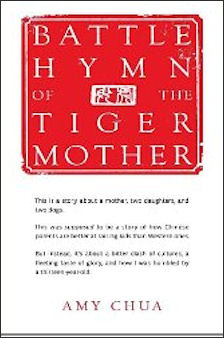
In a Wall Street Journal article and her book “Battle Hymn of the Tiger Mother”, Amy Chua wrote: “A lot of people wonder how Chinese parents raise such stereotypically successful kids. They wonder what these parents do to produce so many math whizzes and music prodigies, what it's like inside the family, and whether they could do it too. Well, I can tell them, because I've done it.[Source: Amy Chua, Wall Street Journal, January 8 2011]
"Here are some things my daughters, Sophia and Louisa, were never allowed to do: 1) attend a sleepover; 2) have a playdate; 3) be in a school play; 4) complain about not being in a school play; 5) watch TV or play computer games; 6) choose their own extracurricular activities; 7) get any grade less than an A; 8) not be the No. 1 student in every subject except gym and drama; 9) play any instrument other than the piano or violin; 10) not play the piano or violin.
"I'm using the term "Chinese mother" loosely. I know some Korean, Indian, Jamaican, Irish and Ghanaian parents who qualify too. Conversely, I know some mothers of Chinese heritage, almost always born in the West, who are not Chinese mothers, by choice or otherwise. I'm also using the term "Western parents" loosely. Western parents come in all varieties.
In her review of “Battle Hymn of the Tiger Mother”, Elizabeth Chang wrote in the Washington Post: ‘sometimes, you're not quite sure whether Chua is being serious or deadpan. For example, she says she tried to apply Chinese parenting to the family's two dogs before accepting that the only thing they were good at was expressing affection. "Although it is true that some dogs are on bomb squads or drug-sniffing teams," she concluded, "it is perfectly fine for most dogs not to have a profession, or even any special skills." On the one hand, she seems aware of her shortcomings: She is, she notes, "not good at enjoying life," and she acknowledges that the Chinese parenting approach is flawed because it doesn't tolerate the possibility of failure. On the other hand, she sniffs that "there are all kinds of psychological disorders in the West that don't exist in Asia." When not contemptuous, some of her wry observations about Western-style child-rearing are spot-on: "Private schools are constantly trying to make learning fun by having parents do all the work," and sleepovers are "a kind of punishment parents unknowingly inflict on their children through permissiveness." [Source: Elizabeth Chang, Washington Post, January 9, 2011]
See Separate Articles:CHINESE WOMEN factsanddetails.com ; WOMEN IN TRADITIONAL CHINESE SOCIETY factsanddetails.com ; GREAT WOMEN AND DRAGON LADIES IN CHINESE HISTORY factsanddetails.com ; HARD LIFE OF WOMEN IN 19TH CENTURY CHINA factsanddetails.com ; WOMEN UNDER COMMUNISM IN CHINA factsanddetails.com ; MEN IN CHINA factsanddetails.com ; DISCRIMINATION AGAINST WOMEN AND WOMEN'S RIGHTS IN CHINA factsanddetails.com ; DOMESTIC VIOLENCE IN CHINA factsanddetails.com ; WOMEN TRAFFICKING IN CHINA factsanddetails.com ; FOOT BINDING AND SELF-COMBED WOMEN IN CHINA factsanddetails.com ; CHILDREN IN CHINA factsanddetails.com ; CHILD REARING IN CHINA factsanddetails.com ; FAMILIES IN CHINA factsanddetails.com ; TRADITIONAL CHINESE FAMILY factsanddetails.com ;
Good Websites and Sources: Women in China Sources fordham.edu/halsall ; Chinese Government Site on Women, All-China Women's Federation (ACWF) Women of China ; Human Trafficking Human Trafficking and Modern Slavery in China gvnet.com ; International Labor Organization ilo.org/public Foot Binding San Francisco Museum sfmuseum.org ; Angelfire angelfire.com ; Wikipedia article Wikipedia
RECOMMENDED BOOKS: “Battle Hymn of the Tiger Mother” by Amy Chua (Penguin Press, 2010) Amazon.com ; “The Mother (1931) by Pearl S. Buck Amazon.com; “Message from an Unknown Chinese Mother: Stories of Loss and Love” by Xinran Amazon.com;“Handbook on the Family and Marriage in China (Handbooks of Research on Contemporary China series) by Xiaowei Zang, Lucy X. Zhao Amazon.com; “Marriage and Family in Modern China (The Library of Couple and Family Psychoanalysis) by David E. Scharff Amazon.com
Difference Between Western Mothers and Chinese Mothers
“Even when Western parents think they're being strict, they usually don't come close to being Chinese mothers,” Amy Chua wrote in the Wall Street Journal. “For example, my Western friends who consider themselves strict make their children practice their instruments 30 minutes every day. An hour at most. For a Chinese mother, the first hour is the easy part. It's hours two and three that get tough. [Source: Amy Chua, Wall Street Journal, January 8 2011]
"Despite our squeamishness about cultural stereotypes, there are tons of studies out there showing marked and quantifiable differences between Chinese and Westerners when it comes to parenting. In one study of 50 Western American mothers and 48 Chinese immigrant mothers, almost 70 percent of the Western mothers said either that "stressing academic success is not good for children" or that "parents need to foster the idea that learning is fun." By contrast, roughly 0 percent of the Chinese mothers felt the same way. Instead, the vast majority of the Chinese mothers said that they believe their children can be "the best" students, that "academic achievement reflects successful parenting," and that if children did not excel at school then there was "a problem" and parents "were not doing their job." Other studies indicate that compared to Western parents, Chinese parents spend approximately 10 times as long every day drilling academic activities with their children. By contrast, Western kids are more likely to participate in sports teams.
"What Chinese parents understand is that nothing is fun until you're good at it. To get good at anything you have to work, and children on their own never want to work, which is why it is crucial to override their preferences. This often requires fortitude on the part of the parents because the child will resist; things are always hardest at the beginning, which is where Western parents tend to give up. But if done properly, the Chinese strategy produces a virtuous circle. Tenacious practice, practice, practice is crucial for excellence; rote repetition is underrated in America. Once a child starts to excel at something — whether it's math, piano, pitching or ballet — he or she gets praise, admiration and satisfaction. This builds confidence and makes the once not-fun activity fun. This in turn makes it easier for the parent to get the child to work even more.
"There are all these new books out there portraying Asian mothers as scheming, callous, overdriven people indifferent to their kids' true interests. For their part, many Chinese secretly believe that they care more about their children and are willing to sacrifice much more for them than Westerners, who seem perfectly content to let their children turn out badly. I think it's a misunderstanding on both sides. All decent parents want to do what's best for their children. The Chinese just have a totally different idea of how to do that.
"Western parents try to respect their children's individuality, encouraging them to pursue their true passions, supporting their choices, and providing positive reinforcement and a nurturing environment. By contrast, the Chinese believe that the best way to protect their children is by preparing them for the future, letting them see what they're capable of, and arming them with skills, work habits and inner confidence that no one can ever take away.
"Western and Chinese parents both want their kids to realise their potential,” Chua told the Times of London. “The difference is that Chinese parents tend to assume that potential is much higher," she says, adding that Western parents simply give up too easily when things get difficult for their children. "The Chinese think that hard work can go a lot farther than perhaps Western parents do. It takes perseverance to discover your gifts." She denies that constantly pushing her daughters to do better ran the risk of damaging their self-esteem. On the contrary, she says, it boosted their confidence by showing them what they were capable of. [Source: Alexandra Frean, The Independent, January 19, 2011]
Insulting Your Kid from the Perspective of a Chinese Mother
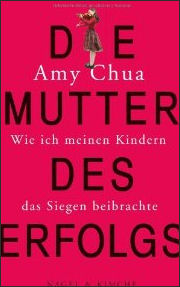
“Chinese parents can get away with things that Western parents can't,” Amy Chua wrote in the Wall Street Journal. “Once when I was young — maybe more than once — when I was extremely disrespectful to my mother, my father angrily called me "garbage" in our native Hokkien dialect. It worked really well. I felt terrible and deeply ashamed of what I had done. But it didn't damage my self-esteem or anything like that. I knew exactly how highly he thought of me. I didn't actually think I was worthless or feel like a piece of garbage. [Source: Amy Chua, Wall Street Journal, January 8 2011]
"As an adult, I once did the same thing to Sophia, calling her garbage in English when she acted extremely disrespectfully toward me. When I mentioned that I had done this at a dinner party, I was immediately ostracized. One guest named Marcy got so upset she broke down in tears and had to leave early. My friend Susan, the host, tried to rehabilitate me with the remaining guests.
"The fact is that Chinese parents can do things that would seem unimaginable — even legally actionable — to Westerners. Chinese mothers can say to their daughters, "Hey fatty! lose some weight." By contrast, Western parents have to tiptoe around the issue, talking in terms of "health" and never ever mentioning the f-word, and their kids still end up in therapy for eating disorders and negative self-image. (I also once heard a Western father toast his adult daughter by calling her "beautiful and incredibly competent." She later told me that made her feel like garbage.)
"Chinese parents can order their kids to get straight As. Western parents can only ask their kids to try their best. Chinese parents can say, "You're lazy. All your classmates are getting ahead of you." By contrast, Western parents have to struggle with their own conflicted feelings about achievement, and try to persuade themselves that they're not disappointed about how their kids turned out.
Child’s Self-Esteem and the Chinese Mother
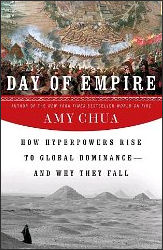
“I've thought long and hard about how Chinese parents can get away with what they do,” Amy Chua wrote in the Wall Street Journal. “I think there are three big differences between the Chinese and Western parental mind-sets. First, I've noticed that Western parents are extremely anxious about their children's self-esteem. They worry about how their children will feel if they fail at something, and they constantly try to reassure their children about how good they are notwithstanding a mediocre performance on a test or at a recital. In other words, Western parents are concerned about their children's psyches. Chinese parents aren't. They assume strength, not fragility, and as a result they behave very differently. [Source: Amy Chua, Wall Street Journal, January 8 2011]
"For example, if a child comes home with an A-minus on a test, a Western parent will most likely praise the child. The Chinese mother will gasp in horror and ask what went wrong. If the child comes home with a B on the test, some Western parents will still praise the child. Other Western parents will sit their child down and express disapproval, but they will be careful not to make their child feel inadequate or insecure, and they will not call their child "stupid," "worthless" or "a disgrace." Privately, the Western parents may worry that their child does not test well or have aptitude in the subject or that there is something wrong with the curriculum and possibly the whole school. If the child's grades do not improve, they may eventually schedule a meeting with the school principal to challenge the way the subject is being taught or to call into question the teacher's credentials.
"If a Chinese child gets a B — which would never happen B — there would first be a screaming, hair-tearing explosion. The devastated Chinese mother would then get dozens, maybe hundreds of practice tests and work through them with her child for as long as it takes to get the grade up to an A.
"Chinese parents demand perfect grades because they believe that their child can get them. If their child doesn't get them, the Chinese parent assumes it's because the child didn't work hard enough. That's why the solution to substandard performance is always to excoriate, punish and shame the child. The Chinese parent believes that their child will be strong enough to take the shaming and to improve from it. (And when Chinese kids do excel, there is plenty of ego-inflating parental praise lavished in the privacy of the home.) "
Chinese Parents Believe They Know What’s Best and Their Children Owe Them Everything
Chua wrote: "Chinese parents believe that their kids owe them everything,” Amy Chua wrote in the Wall Street Journal. “The reason for this is a little unclear, but it's probably a combination of Confucian filial piety and the fact that the parents have sacrificed and done so much for their children. (And it's true that Chinese mothers get in the trenches, putting in long grueling hours personally tutoring, training, interrogating and spying on their kids.) Anyway, the understanding is that Chinese children must spend their lives repaying their parents by obeying them and making them proud. [Source: Amy Chua, Wall Street Journal, January 8 2011]
"By contrast, I don't think most Westerners have the same view of children being permanently indebted to their parents. My husband, Jed, actually has the opposite view. "Children don't choose their parents," he once said to me. "They don't even choose to be born. It's parents who foist life on their kids, so it's the parents' responsibility to provide for them. Kids don't owe their parents anything. Their duty will be to their own kids." This strikes me as a terrible deal for the Western parent.
"Chinese parents believe that they know what is best for their children and therefore override all of their children's own desires and preferences. That's why Chinese daughters can't have boyfriends in high school and why Chinese kids can't go to sleepaway camp. It's also why no Chinese kid would ever dare say to their mother, "I got a part in the school play! I'm Villager Number Six. I'll have to stay after school for rehearsal every day from 3:00 to 7:00, and I'll also need a ride on weekends." God help any Chinese kid who tried that one. Don't get me wrong: It's not that Chinese parents don't care about their children. Just the opposite. They would give up anything for their children. It's just an entirely different parenting model."
Coercion, Chinese-Style
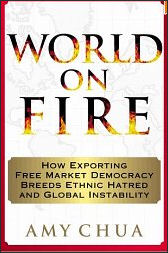
“Here's a story in favor of coercion, Chinese-style,” Amy Chua wrote in the Wall Street Journal. Lulu was about 7, still playing two instruments, and working on a piano piece called "The Little White Donkey" by the French composer Jacques Ibert. The piece is really cute — you can just imagine a little donkey ambling along a country road with its master — but it's also incredibly difficult for young players because the two hands have to keep schizophrenically different rhythms. Lulu couldn't do it. We worked on it nonstop for a week, drilling each of her hands separately, over and over. But whenever we tried putting the hands together, one always morphed into the other, and everything fell apart. Finally, the day before her lesson, Lulu announced in exasperation that she was giving up and stomped off. [Source: Amy Chua, Wall Street Journal, January 8 2011]
"Get back to the piano now," I ordered... "You can't make me."..."Oh yes, I can."... Back at the piano, Lulu made me pay. She punched, thrashed and kicked. She grabbed the music score and tore it to shreds. I taped the score back together and encased it in a plastic shield so that it could never be destroyed again. Then I hauled Lulu's dollhouse to the car and told her I'd donate it to the Salvation Army piece by piece if she didn't have "The Little White Donkey" perfect by the next day. When Lulu said, "I thought you were going to the Salvation Army, why are you still here?"
I threatened her with no lunch, no dinner, no Christmas or Hanukkah presents, no birthday parties for two, three, four years. When she still kept playing it wrong, I told her she was purposely working herself into a frenzy because she was secretly afraid she couldn't do it. I told her to stop being lazy, cowardly, self-indulgent and pathetic. Jed took me aside. He told me to stop insulting Lulu — which I wasn't even doing, I was just motivating her — and that he didn't think threatening Lulu was helpful. Also, he said, maybe Lulu really just couldn't do the technique — perhaps she didn't have the coordination yet — had I considered that possibility?
"You just don't believe in her," I accused... "That's ridiculous," Jed said scornfully. "Of course I do."... "Sophia could play the piece when she was this age."..."But Lulu and Sophia are different people," Jed pointed out. "Oh no, not this," I said, rolling my eyes. "Everyone is special in their special own way," I mimicked sarcastically. "Even losers are special in their own special way. Well don't worry, you don't have to lift a finger. I'm willing to put in as long as it takes, and I'm happy to be the one hated. And you can be the one they adore because you make them pancakes and take them to Yankees games."
"I rolled up my sleeves and went back to Lulu. I used every weapon and tactic I could think of. We worked right through dinner into the night, and I wouldn't let Lulu get up, not for water, not even to go to the bathroom. The house became a war zone, and I lost my voice yelling, but still there seemed to be only negative progress, and even I began to have doubts. Then, out of the blue, Lulu did it. Her hands suddenly came together — her right and left hands each doing their own imperturbable thing — just like that. Lulu realized it the same time I did. I held my breath. She tried it tentatively again. Then she played it more confidently and faster, and still the rhythm held. A moment later, she was beaming.
"Mommy, look — it's easy!" After that, she wanted to play the piece over and over and wouldn't leave the piano. That night, she came to sleep in my bed, and we snuggled and hugged, cracking each other up. When she performed "The Little White Donkey" at a recital a few weeks later, parents came up to me and said, "What a perfect piece for Lulu — it's so spunky and so her."
Even Jed gave me credit for that one. Western parents worry a lot about their children's self-esteem. But as a parent, one of the worst things you can do for your child's self-esteem is to let them give up. On the flip side, there's nothing better for building confidence than learning you can do something you thought you couldn't.
Amy Chau, Her Daughters Sophia and Lulu and Husband Jed
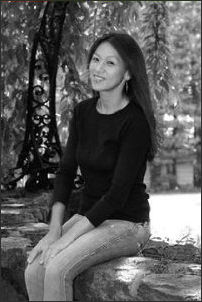
Amy Chau Amy Chua—the author of “Battle Hymn of the Tiger Mother” — is a professor at Yale Law School and author of two acclaimed books on international affairs — “Day of Empire” and “World on Fire: How Exporting Free Market Democracy Breeds Ethnic Hatred and Global Instability”. Elizabeth Chang wrote in the Washington Post: “Readers of "Tiger Mother" get only a glimpse of that part of her life, with airy, tossed-off lines such as "Meanwhile, I was still teaching my courses at Yale and finishing up my second book" while also "traveling continuously, giving lectures about democratization and ethnic conflict."[Source: Elizabeth Chang, Washington Post, January 9, 2011]
Chau lives in a nice, well-decorated home just outside the Yale University campus. Born in the United States to immigrant parents, she married a Jewish American she met while studying law at Harvard University. Chua juggled supervising her children's studies with her own career. That meant rising early, sometimes at 5.30am, to work before taking the girls to school, working with her kids after picking them up from school at 3:30pm and then often returning to work at 6:00pm. “I was always rushing, driving, being late for everything, missing things, messing things up, piecing bits of time together,” she told the Times of London . [Source: Alexandra Frean, The Independent, January 19, 2011]
Chua said that she was only raising her two daughters the way her immigrant parents raised her. "I don't really have time for anything fun, because I'm Chinese," one of Chua's daughters told a friend. “Though Chua's Jewish husband grew up with parents who encouraged him to - imagine! - express himself, he nonetheless agreed to let her take the lead in rearing the children and mostly serves as the Greek chorus to Chua's crazed actions,” Chang wrote.
Alexandra Frean wrote in Times of London, “Chua chose maths and music for her daughters, but it seems likely that she could have made them excel in any field. Chua's older daughter, Sophia, a pianist, went along with, and blossomed under, this approach. The younger daughter, Lulu, whose instrument of Chua's choice was the violin, was a different story. One day, Frean wrote, “Chua banished her daughter Lulu, then 3, to the garden without a coat when the temperature was -6C because the girl refused to co-operate with her first piano lesson. The punishment was not only extreme, it was also futile because a defiant Lulu had to be bribed with brownies and hot chocolate before she would come back in.” On another occasion she threatens to burn all of her elder daughter Sophia's soft toys until she plays a piano piece perfectly. Throughout all of this, the role of her husband Jed (51 in 2011) has been to provide balance, insisting on family bike rides and trips to water parks. Although he sometimes had reservations about his wife's strictness, he was won over by the impressive results. Raised by very liberal parents himself, he wished that his parents had pushed him harder to persevere with music and foreign languages.”
“It seemed, at first, to be working: from a very early age her daughters became outstanding students at school and were hailed as musical prodigies. At age 13 Sophia performed a piano solo at Carnegie Hall in New York. At 12, Lulu, a violinist, became concert master of a prestigious youth orchestra....Eventually, however, Chua realised she was pushing her girls too hard. Lulu had always fought hardest against her mother's demands and when she turned 13 last year refused to co-operate any more, sparking a string of explosive rows. Lulu expressed her hatred of the violin, her mother and of being Chinese. Chua imagined a Western parent's take on Lulu's rebellion: "Why torture yourself and your child? What's the point? . . . I knew as a Chinese mother I could never give in to that way of thinking." But Realising that she risked "losing" her daughter, Chua finally backed off and agreed a year ago that she could no longer micromanage her daughters' lives. Lulu promptly gave up violin lessons and took up tennis.
"Things are much calmer, and everyone seems happier," Chua says. Recently she even allowed Sophia to go to a rap concert and to start dating. The girls do not appear to resent their mother. In fact, Sophia has said she wasn't "subjected" to Chinese parenting, but rather that she "went along with it by my own choice". The biggest surprise has been Lulu's response. She seems to have mild regrets that her mother never gave her any choice when she was younger, beyond offers such as "do you want to practice six hours or five?" but she says that she loves playing the violin on her own terms. Although glad of her new-won freedoms, she has told her mother: "I'm glad you forced me to play the violin. I'm always going to love the violin." [Op. Cit, Frean]
Chua says she is now beginning to see the longer-term benefits: Sophia (18 in 2011), has just applied for college on the East Coast. While other parents hired tutors to write application essays and visited 30 different institutions, Chua took a back seat. "I felt that my work had been done a lot earlier," she says. "I said to Sophia, it's your responsibility — pick your schools and write your own essay. I have taught you all I have to teach you." [Op. Cit, Frean]
Review of Battle Hymn of a Tiger Mother
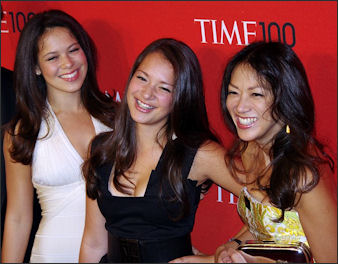
Chau and her daughters in 2011 In her review of the book, Elizabeth Chang wrote in the Washington Post: “The cover of "Battle Hymn of the Tiger Mother" was catnip to this average parent's soul. The memoir, the text says, was supposed to have proved that Chinese parents are better at raising children than Western ones - but instead it portrays "a bitter clash of cultures, a fleeting taste of glory" and the Tiger Mother's humbling by a 13-year-old. As a hopelessly Western mother married into a Chinese family, living in an area that generates immigrant prodigies as reliably as clouds produce rain, I was eager to observe the comeuppance of a parent who thought she had all the answers. [Source: Elizabeth Chang, Washington Post, January 9, 2011]
And, in many ways, "Tiger Mother" did not disappoint. At night, I would nudge my husband awake to read him some of its more revealing passages, such as when author Amy Chua threatened to burn her older daughter's stuffed animals if the child didn't improve her piano playing. "What Chinese parents understand," Chua writes, "is that nothing is fun until you're good at it." By day, I would tell my own two daughters about how Chua threw unimpressive birthday cards back at her young girls and ordered them to make better ones. For a mother whose half-Chinese children played outside while the kids of stricter immigrant neighbors could be heard laboring over the violin and piano, the book could be wickedly gratifying. Reading it was like secretly peering into the home of a controlling, obsessive, yet compulsively honest mother - one who sometimes makes the rest of us look good, if less remarkable and with less impressive offspring. Does becoming super-accomplished make up for years of stress? That's something my daughters and I will never find out.
In Chinese parenting theory, hard work produces accomplishment, which produces confidence and yet more accomplishment. As Chua notes, this style of parenting is found among other immigrant cultures, too, and I'm sure many Washington area readers have seen it, if they don't employ it themselves....Readers will alternately gasp at and empathize with Chua's struggles and aspirations, all the while enjoying her writing, which, like her kid-rearing philosophy, is brisk, lively and no-holds-barred. This memoir raises intriguing, sometimes uncomfortable questions about love, pride, ambition, achievement and self-worth that will resonate among success-obsessed parents. Is it possible, for example, that Chinese parents have more confidence in their children's abilities, or that they are simply willing to work harder at raising exceptional children than Westerners are?
Unfortunately, the author leaves many questions unanswered as her book limps to a conclusion, with Chua acknowledging her uncertainty about how to finish it and the family still debating the pros and cons of her methods (anyone hoping for a total renunciation of the Chinese approach will be disappointed). Ending a parenting story when one child is only 15 seems premature; in fact, it might not be possible to really understand the impact of Chua's efforts until her daughters have offspring of their own. Perhaps a sequel or a series ("Tiger Grandmother"!) is in the works. But while this battle might not have been convincingly concluded, it's engagingly and provocatively chronicled. Readers of all stripes will respond to "Tiger Mother."
Amy Chua’s Reaction to the Response Over Her Book
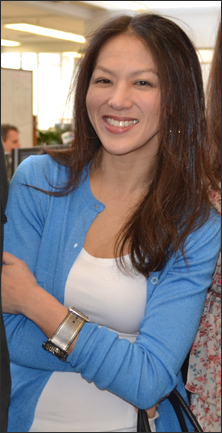
Amy Chau Amy Chau told the Atlantic, “I was stunned by how the book was received. Much of the book is making fun of myself, and I had hoped people would find it funny. It may be hard to believe, but people who know me think of me as supportive and self-deprecating. [Source: Lori Gottlieb, The Atlantic, November 2011]
You felt misunderstood? “Very much so. Most people talking about the book had not actually read it. The book is a memoir, not a parenting guide. On the Today show, they introduced me by saying, “People think you’re a monster, that you abused your children.” It was very painful. I broke down a few times, then I thought, I can crawl into a hole or I can be strong. So I went on the road for six months, and appreciated the opportunity to explain myself.”
On her supporters, Chau said: “I was grateful for their support. Parents of all backgrounds who favor stricter parenting said, “You are so brave, it was always a closet practice to raise our kids this way, and now we don’t have to feel ashamed of what we think is right.” Everybody wants to know why so many Asian kids are good at math and achieve so much, and many readers said, “This is such a relief: it’s not genetic, it’s not in the rice! It’s about hard work, so we can do this!”
Do you think you went too far in showing your uber-strict side? [My daughter] Sophia said, “You only put extreme moments in the book.” It’s true. I exposed a slice of our life, not the part where we’re lying in bed watching movies. I tell my kids that I love them, like, 10 times a day, and that’s not in the book. But I also sacrifice a tremendous amount for my kids. I don’t just make them work hard — I have to work just as hard to be that kind of mom.
How have your parents influenced the way you raise your kids? My parents were like so many first-generation immigrants. They worked all the time and saved every penny for their kids’ education. They taught us never to take any opportunity for granted. Also, my mother never complimented me, whereas I compliment my kids constantly. Yet I’m very close with my parents, and I love the way they raised my sisters and me.What values do you want to instill in your own kids? Many people don’t realize it, but my book celebrates rebellion. [My daughter] Lulu was a heroine of the book, and she’s a rebel. I admire independent thinkers. I don’t want to have to apologize for doing things differently. I’m proud of it.
Chua was named by Time Magazine as one of the "World's 100 Most Influential People" in 2011. But after excerpts of her book were published in the Wall Street Journal Chua was the target of much criticism, including death threats — a response which she said turned her life upside down. In October 2011, Chua urged strict Asian parents to relax and give their children more freedom but also insisted that parents also avoid the "romanticised" Western focus on creativity over hard work. "I think Western parents give kids too much freedom, too much choice at a young age... Asian parents like in Korea have opposite problems, giving too little freedom, too little choice for our kids," Chua said in a speech at a Seoul forum.She stressed that Asian parents often put too much focus on children's academic excellence while failing to foster social skills and "emotional intelligence". "As we head into the 21st century and global competition gets intense, simply emphasising hard work and memorising and long hours is not going to be enough," she said, urging a balance between the different parenting philosophies. [Source: AFP, October 13, 2011]
In China, Not All Practice Tough Love
In article published at the same time as Amy Chua’s Chinese Mother Are Superior article, Victoria Ruan wrote in the Wall Street Journal, “Parenting advice in China has long stressed discipline and authority. Those lessons are reinforced in best-selling books like "Harvard Girl Liu Yiting," a how-to manual published in 2000 by the parents of a student who won a coveted spot at the Ivy League school. Among the character-building exercises to which they subjected their daughter was having her hold ice cubes in her hands for long stretches. [Source: Victoria Ruan, Wall Street Journal, January 8, 2011]
When it comes to parenting, the Chinese seem to produce children who display academic excellence, musical mastery and professional success - or so the stereotype goes. WSJ's Christina Tsuei speaks to two moms raised by Chinese immigrants who share what it was like growing up and how they hope to raise their children. In recent years, however, books that encourage parents to nurture their children's independence and confidence, as opposed to focusing exclusively on high academic achievement, have grown increasingly popular. They reflect a quiet shift in the parenting style of middle-class families, especially in China's growing cities.
The current best-selling parenting book, "A Good Mom Is Better Than a Good Teacher," by former Beijing public school teacher Yin Jianli, has sold more than two million copies since it was published in January 2009. Ms. Yin advocates listening to kids and developing their potential without forcing them to obey authority.
Chinese parents rarely question the decisions of teachers, but Ms. Yin sometimes offered to do homework for her daughter. In one case, a teacher had asked the girl to copy the same words over a dozen times one night as punishment for failing to memorize them. Ms. Yin believes that such tasks hurt children's interest in studying. Another best-seller, "Catching Children's Sensitive Periods" by Sun Ruixue, follows a similar approach. Ms. Sun writes that she "aims to help more parents understand their kids and let every kid grow up healthily in love and freedom." It is a sequel to her 2000 book "Love and Freedom," which focused on the idea of discovering a child's "true nature," as developed by the Italian physician and education reformer Maria Montessori.
In "My Kid Is a Medium-Ranking Student," author Fang Gang stresses that children don't necessarily need the highest test scores to enjoy a happy and successful life. "Our society, to some extent, remains a society full of ranking-related prejudice," he writes. But among the students with the top test scores, he asks, "how many have kept independent thinking, creativity and their unique characteristics?"
Two Chinese Schoolgirls Publish Book on How to Combat Tiger Mothers
Leo Lewis wrote in the Times of London. “Two Beijing schoolgirls, already masters of manipulation at the tender age of ten, have unleashed a daring counter-attack against Tiger Mothers. Chen Leshui, and Deng Xinyi describe their practical and devious solutions in "Dealing with Mom Tactics Collection”. The guide, written in ballpoint pen on a battered notebook, for children between 6 and 12, and illustrated with crude diagrams of each "trick", catalogues how to navigate the relentless lectures and chastisements of everyday life. Mothers, are you prepared, get ready to deal with these!” they warned at the beginning.[Source: Leo Lewis, The Times December 9, 2011; Sohu Weibo & Sina Weibo , December 10, 201]
"How to Deal with Mom: Tactics: 1): When your mother is yelling at you, you can: Look elsewhere, think about something else. Don’t care, don’t listen. Style: Hard. Note: Can’t be used often. Tactic 2): Your mother is yelling at you and not letting you look somewhere else, you can: Find something trivial about mommy to criticize. Style: Hard. Note: Can’t be used often.Tactic 3) : When your mother is yelling at you with all her might, you can: Pretend to cry (put some effort into it!). Style: Soft. Note: Must look real (can be used often). Tactic 4): When your mother is yelling at you with all her might, you can also: Throw yourself onto your mom and cry. Style: Soft + soft. Note: Can be used often.
5): When your mother is yelling at you with all her might, you can run back to your own room. Style: Hard + soft. Note: Don’t forget to lock the door (you can cry in your room). Tactic 6): After your mother yelled at you, you can: Not speak to your mother. Style: Hard. Note: Can’t be used often. Tactic 7): After your mother yelled at you, if she asks you something, you can: Reply to her question with your eyes closed (at best!). Style: Soft + hard. Tactic 8): After your mother yelled at you, you can: sulk/stay angry (at worst). Style: Hard + hard. Note: Must use sparingly.
9): When your mother is yelling at you, you can say: I’ll/it’ll be good next time, I promise! (First get through this instance now and deal with the next instance when it happens). Style: Soft + hard. Tactic 10): After mommy has finished yelling at you, and her anger hasn’t yet dissipated, you can: Write a note and stick it under her door. Style: Normal. Tactic 11): After mommy has finished yelling at you, you can: Secretly enter her room. Style: Normal. Tactic 12): After mommy has finished yelling at you, you can: Use some small things around you to make a mini-weapon. Style: Normal.
13): After mommy has finished yelling at you, you can: Sing, for example: “Mommy is a small watermelon.” Style: Hard. Note: Can’t be used often. Tactic 14): After mommy has finished yelling at you, you can: Fall on the ground, cover your years, and keep saying: “I can’t hear you, I can’t hear you?” Style: Hard + hard. Note: Can’t be used often.Tactic 15): When your mother is yelling at you, you can: After covering your ears, scream: “I know!!!” Then run away. Style: Hard + hard + hard Note: Must use sparingly! Tactic 16): When your mother is yelling at you, you can: Hang your head and remain silent, letting your mom think you are admitting fault. Style: Normal.
17): After your mother has yelled at you, you can: Shout that you’re going to run away, take some things, run to the stairs, and run down crying. Style: Soft. Tactic 18): When your mother is yelling at you, you can: As your mother is yelling at you, you suddenly say: Can’t I go to the toilet? This way you can hide in the bathroom. Style: Sort of hard. Note: Best used sparingly.
Image Sources: Wikimedia Commons, Amazon,
Text Sources: New York Times, Washington Post, Los Angeles Times, Times of London, Yomiuri Shimbun, The Guardian, National Geographic, The New Yorker, Time, Newsweek, Reuters, AP, Lonely Planet Guides, Compton’s Encyclopedia and various books and other publications.
Last updated October 2021
